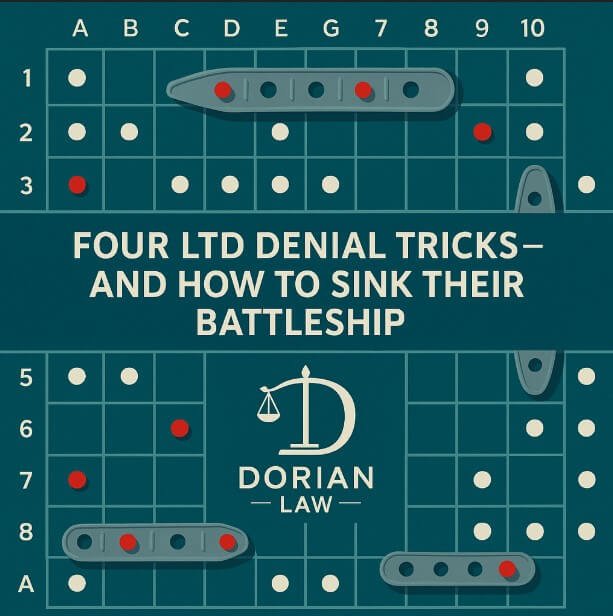Four Long-Term Disability Denial Tricks — And How to Beat Them
TL;DR:
Insurers lean on four predictable tactics to terminate LTD claims: (1) they blow the 45-day appeal deadline, (2) they cherry-pick your medical chart, (3) they slap on the 24-month “self-reported” cap, and (4) they pretend your hobby equals a full-time desk job. In Wonsang v. Reliance Standard (4th Cir. June 13 2025) the court knocked down every one of those moves. Here’s how to use that blueprint against your own denial.
Trick #1: The Deadline Gamble
ERISA’s claims-procedure regulations give insurers 45 days to issue a written decision on an LTD appeal (29 C.F.R. § 2560.503-1(i)(1)(i)). If they neither decide nor properly request an extension, the claimant is “deemed to have exhausted” administrative remedies and may sue immediately. In Wonsang, Reliance let the clock run out; when Ms. Wonsang’s lawyer warned that she would treat the deadline breach as exhaustion, the court agreed and stripped Reliance of its discretionary “abuse-of-discretion” shield, applying de novo review instead.
Why it matters: When an insurer blows a statutory deadline, it can forfeit the deferential “abuse-of-discretion” review that normally favors the insurance company and instead face a level playing field in court.
Trick #2: Cherry-Picking the Records
An ERISA fiduciary must evaluate the whole administrative record, not isolate passages that favor denial. Reliance spotlighted a single office note describing a “normal” exam and “full range of motion” while omitting the same note’s findings of fatigue, joint pain, and cognitive issues. The court called that selective reading “distortion,” reinforcing that courts will view such one-sided excerpts as evidence of an unreasonable decision rather than objective support.
Why it matters: Pull the full chart—context turns the insurer’s sound-bite into proof of distortion.
Trick #3: The 24-Month “Self-Reported” Trap
Many LTD policies cap benefits at 24 months for conditions that “cannot be verified using generally accepted standard medical procedures.” Reliance tried to invoke that limitation only after losing on the merits, asking for a remand to apply its Self-Reported Conditions cap. The record, however, already contained multiple MRIs confirming cervical disc herniations and spinal stenosis—objective findings that put Ms. Wonsang’s impairment outside the self-reported category. The court deemed a remand “futile” because the limitation was inapplicable as a matter of law.
Why it matters: Objective evidence (MRI, CT, EMG, FCE) might neutralize the self-reported cap before it starts.
Trick #4: The “Hobby = Job” Fallacy
Insurers often cite social-media posts or light hobbies as proof a claimant can return to full-time work, ignoring the stamina, consistency, and productivity required in “any occupation.” Reliance argued Ms. Wonsang’s book project and occasional blog entries showed employability. The Fourth Circuit dismissed the comparison, noting that writing “for intermittent periods … from the comfort of her home” is irrelevant to sustaining a 40-hour job with strict schedules and performance metrics. Sporadic activities, without context of recovery time and symptom flare-ups, do not equate to competitive employment.
Why it matters: A selfie or a single blog post doesn’t capture the hours of rest, medication, or adaptive gear required before and after an activity. Provide that context and sink the insurance company’s battleship.
Your Counter-Move Checklist
Track the Clock: Mark the 45-day appeal deadline on your calendar. Day 46? Send a letter reserving your rights.
Get the Whole Record: Request the complete chart—not just the excerpts in the denial.
Invest in Objective Proof: Schedule the imaging or functional-capacity test your doctor recommends.
Document the Real-World Cost of Hobbies: Explain breaks, braces, or pain meds that make a short activity possible but paid work impossible.
Force a Real Job Match: Policies require a job you’re “reasonably suited” for by “education, training or experience”. Make the adjuster name it and show how you’d meet every duty.
Next Step: Turn “No” into “Not So Fast”
Email Dorian Law your denial letter. We’ll review it—free of charge—and map the quickest route to reinstating your benefits.
FAQ
Q1: My insurer missed the 45-day appeal deadline—do I automatically win?
Not automatically, but you’ve gained leverage. Courts can strip the insurer of its usual “abuse-of-discretion” cushion, meaning the judge reviews your evidence with a clean slate. We use that shift to press for reinstatement—or settle on favorable terms—before trial.
Q2: Isn’t a normal physical exam enough for an insurer to deny my claim?
A single “normal” note can’t outweigh imaging, specialist reports, and functional-capacity tests. In Wonsang, the court called out Reliance for ignoring fatigue, joint pain, and cognitive limits buried in the same “normal” exam it quoted.
Q3: How do I prove my pain isn’t just “self-reported”?
Objective tools—MRI, CT, EMG, nerve-conduction studies—translate pain into data an insurer can’t spin. When that evidence exists, the 24-month self-reported cap simply doesn’t apply.
Q4: Will posting on social media hurt my LTD claim?
Not if you provide context that shows it is consistent with your disability. A photo shows you smiling; it doesn’t show the two hours of rest or medication that made that moment possible. Courts—including the Fourth Circuit in Wonsang—dismiss hobby snapshots as proof of employability when the full story contradicts them.
Q5: What does it cost to hire Dorian Law for an LTD appeal?
We work on contingency for most LTD cases—no fee unless we recover benefits for you. Your first strategy review is free.
Why Dorian Law?
We force insurers to back down when they try to stretch “Any Occupation” beyond reason—leveraging objective tests, vocational experts, and ERISA precedence to restore benefits. If your demanding career is being reduced to a desk-job sound bite, let’s talk.
Free Strategy Call – Share your denial letter, and we’ll map the fastest path from “No” to “Not so fast.”

